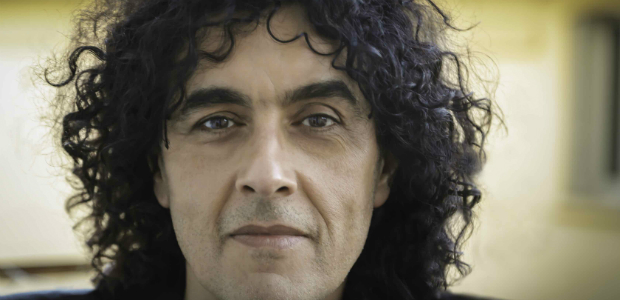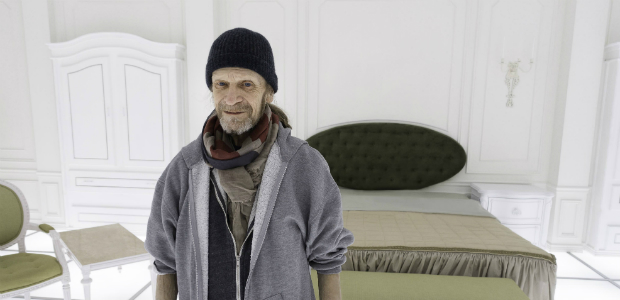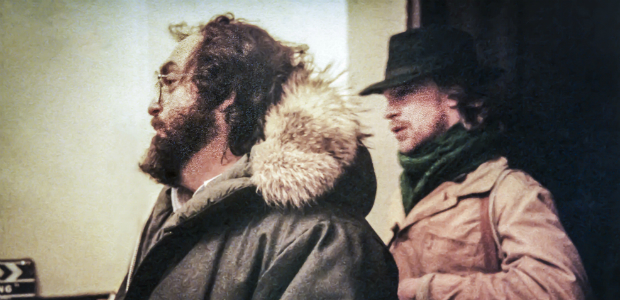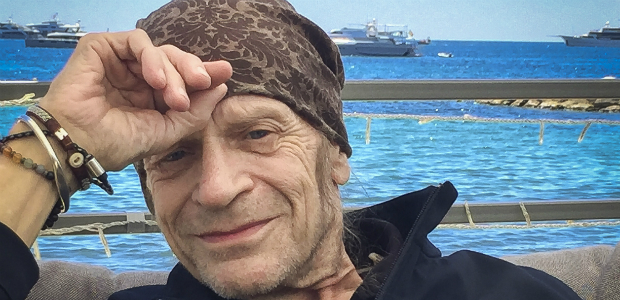Tony Zierra
The director of Filmworker tells incredible story of Leon Vitali.

In 1974 an acclaimed young actor, Leon Vitali, had landed a major, career-changing role in a Stanley Kubrick movie. Already an acclaimed actor before Barry Lyndon—Vitali had an avid following from British TV, had been given prestigious stage offers, and his picture frequently featured on the cover of fan magazines—his experience on the film developed into an obsession (eventually an addiction) about the mechanics and nuances of filmmaking: specifically, the filmmaking of Stanley Kubrick. Giving up his career as an actor, it was also like he’d been bewitched; he entered the orbit of Stanley Kubrick, like a moth to the flame of Kubrick, heedless of being burned, sacrificing his own life, own safety, own sanity to be near the light. Vitali knew nothing of filmmaking before coming under the thrall of Kubrick, but under his Svengali’s eye he soon becomes adept at casting, then editing, then overseeing artwork, then color-timing and script supervision. He also acted when Kubrick told him to, oversaw grip and camera work, performed the duties of an assistant director, and became, in essence, a key component to Kubrick’s creativity. After Kubrick’s death in 1999, Vitali’s devotion did not end and in fact, in some ways, grew even stronger. He dedicated his life to preserving the master’s work, painstakingly overseeing the restoration and preservation of all of Kubrick’s work with an eye to detail that cloned Kubrick’s own. But without Kubrick, he was set adrift, pursuing his work without support, without recognition, with little access and less money. It was in Los Angeles, toiling in obscurity, that Tony Zierra came across him.
Garth Twa: How did the whole project begin?
Tony Zierra: Originally I’ve been working on a Kubrick doc, focused on Kubrick’s creative mind.
GT: And it’s coming out soon, I see?
TZ: Yes, it’s SK 13. So I’d been doing research for about ten years. And, from talking to people, I knew that Leon was essential. Leon was really the closest to him creatively—they spent hours together every day. So when I finally tracked him down—he lives in L.A.—I was really struck because how is it possible that this man lives by himself in this house off Venice Boulevard, all alone? I really pictured something else.
GT: It’s one of those L.A. things. You meet people and you have no idea, they’re your neighbours for years and you find out they have these unbelievably interesting lives. There was this loud person that lived in the building next door to me who I used to hear every morning, and it turned out to be Holly Woodlawn, the Superstar from Warhol’s Factory.
TZ: That’s exactly Los Angeles. It’s a vicious city. So when Leon told me what happened, we really built a bond and became really close. Then I came back a week later and said, “Hey, can I make a documentary about you?” He didn’t want to do it at first, you know, because he’s used to talking about Stanley, not about himself, and I think he thought he was forgotten, that it didn’t matter. Finally I convinced him, and I put the Kubrick project aside. I just wanted to get the film out there, that was the dream, and hopefully it would do well and Leon would be alive to enjoy the acknowledgement. That’s how the whole thing started.

I think Kubrick is a creative junkie and Leon is a creative junkie and I’m a creative junkie and there’s nothing wrong with it. You know, people get addicted to stupid things, and I’d rather be addicted to creativity; it’s beautiful.
GT: That’s fascinating that somehow Leon finally got to overshadow Kubrick.
TZ: Yes, It’s really amazing. But, you know, Kubrick will always be Kubrick. He’s big in New York right now. It’s all Kubrick, with the photography exhibit of his early years as a photographer. It’s a Kubrick year again, but it’s always a Kubrick year. He’s unique.
GT: So, your own attraction to Kubrick, that first led you to Kubrick and then to Leon. What was that?
TZ: I like a lot of filmmakers, from Bergman to Tarkovsky and others, people like that. That was the poet’s period, I think. And Kubrick always had that. No matter how long it’s been, whether the movie came out 30 years ago, like Full Metal Jacket, or he’s been dead for 20 years, it doesn’t matter. He never loses his shelf life. And he really worked hard, that’s what really made me really love him and respect his work. He really worked a lot, he gave his whole life to his films. So it really started when Eyes Wide Shut came out and there was a big hoopla. Everybody was running to the theatre, everybody was trying to figure out what was in the movie. When I saw Eyes Wide Shut it got me spinning for ten years because I was really shocked about how it was perceived, how it got bad reviews. I started to dig to find out what he was going for, what ended up happening, did the film ruin him, and, you know, all of the questions and the rumors that came out about whether it was Tom and Nicole that destroyed the film, as has been claimed. So it was all these questions. So that’s how the whole journey started; I started to dig and once I figured out what I needed to know, I felt like I had to tell this story from the beginning, creatively, about how things shifted. And Leon, of course, is in Eyes Wide Shut, too. So it was a combination—I’m going to get to really hear what was happening on the set and I learned so much from Leon about Stanley that I really didn’t know even though I had researched really intensively. You learn so much from someone like him; he was there 24/7, pretty much.
GT: It’s interesting about both Leon’s reaction to Kubrick and your own—it’s like he has a power, some Great Man magic. He’s almost like a dictator, with a personality that transfixes Leon, who basically gave up his life for him.
TZ: Yes, that’s what you do with films, good films. Even good books, or good plays, or good music, that’s what you do. You revere how much these artists really devoted their entire life. And it’s an addiction to creativity, actually, I believe, as you saw in the film, it’s a bit of an obsession. I think Kubrick is a creative junkie and Leon is a creative junkie and I’m a creative junkie and there’s nothing wrong with it. You know, people get addicted to stupid things, and I’d rather be addicted to creativity; it’s beautiful. It’s better than being addicted to drugs. You know what I mean?
GT: You certainly have a lot more to show for it at the end.
TZ: Exactly. And it’s also like service; it’s beautiful and I think Leon really gravitated towards that. So he never really saw it in a negative light. He always saw it as—and as he says it in the film—giving everything he’s got to what he was doing, to his films. That’s what I reacted to.
GT: He’s a fascinating character because he was devoted to and in service of someone else’s creativity. I mean, you could see Kubrick being obsessed with making his films, but for Leon to give up even more and not even get the recognition… it’s a selfless sort of service that he did.
TZ: Yeah. In our industry, every director out there who is either working or not working, they all think they’re Kubrick; they all want to be Kubrick, they all strive to be like him. So to have somebody like Leon who gets the opportunity and the chance to actually be near that man all the time? I think he went for it, because I think there are a lot of people out there who would go for it, too. I don’t know how long they would last; with Leon it was the perfect combination because I think Kubrick was brilliant at something and he found someone who had the sensibility, an eye, was classically trained, and he figured, “You know what? If I could also just teach him the technical stuff, I’m all set, because I could just work my ass off and assign him other things.” And you could see towards the end of his life, as his crew got smaller and smaller because I think he had a really tight army around him that knew what they were doing, he could work without distraction. But, of course, that’s what ended up killing him—I mean the man, really, was working even on the night he died. So, I think that’s what it is. It’s like Leon found the source. It’s almost like kids with Disneyland: Stanley was Leon’s Disneyland, you know? He couldn’t get enough of it. And he wasn’t just a typical assistant, like just getting coffee, it was like a privilege: you get to act, you get to cast, you get to train big actors, you get to go to the lab, you get to deal with sound… and he was in charge of restoring everything. What an accomplishment for an actor who didn’t even know, on the set of Barry Lyndon, what an 18mm lens was. The journey from that place to where he ended up, it’s really shocking, you know? It’s cool.

GT: But to subsume his own personality to the service of Kubrick, do you think any other director could command that kind of loyalty and that kind of sacrifice? Do you think any other director could exert that kind of influence?
TZ: I don’t think so. Stanley Kubrick, he was almost like constructed and built from an early age, from a child, to become that being. How many people would have the opportunity to walk around and travel everywhere and become this really serious photographer at 17 years old? He understood photography really from the inside out by the time he started making movies and documentaries. And we always forget this, but he was one of the earliest independent directors, walking through the streets doing his own sound, doing camera. I think his situation was unique. He didn’t go to NYU and graduate and have a lab there where he would get to practice—he was doing things on the street. I don’t know, I think the proof is the shelf life. How many people are there who have been dead for 20 years and their movies that still puzzle audiences and get studied? It’s so fascinating how it just keeps riding the wave. When we opened here in New York, I was shocked at how many young people showed up mixed with old people. I was like, “Wow, he really does this thing with people.” It’s brilliant. And some people still don’t agree with some of the movies. It’s funny, it keeps changing. I think he is like a Shakespeare in cinema, he is like Leonardo. It takes a long time to absorb the material because it’s so packed and it’s so well thought out, and as Leon said, he wasn’t one of those directors that just sat in a chair and said “Action” and had a big cigar in his mouth; he just wasn’t one of those guys. And I think that’s what the problem is with a lot of modern directors, they abuse that power. They think that power is creativity and it isn’t. Kubrick wore the same outfits, you know, he had ten or twenty of them, and just didn’t go outside, and never took a vacation. You see the dedication. Yeah, it’s rare, really. I adore him for that because it was pure. It is pure. In every way.
GT: In the movie it’s kind of heartbreaking when the museum exhibit is being mounted and Leon’s not even invited. Was there some animosity towards him in the industry?
TZ: Not at all. It’s a status thing. I’ve seen it even with friends: if they make a big movie, they’re everything, and they make a so-so a movie or they haven’t worked in a while, nobody gives a shit about them. Leon was just an assistant, and the studios would take whatever they could get from him and they would use him and they would then throw him aside. And that happens every single day in our industry. It’s terrible. And that was really one of the reasons I thought that it might be a good idea for a movie. There are so many people I’ve met who would introduce themselves, “Oh, yeah, I work in movies,” and I would ask what they did and they’d say—and they’d always use the word “just” before they said it—“Just a gaffer,” or “Just a grip,” or “just an assistant.” Because they really feel that they’re not on that level. So I think when the museum thing happened, it was more important to invite Jennifer Aniston, it was more important to invite all the big names. If someone asked who Leon was, they’d just say he’s an assistant, so they don’t even invite him. He even took me, and he had to stand in line to buy tickets. And he had to go so many times. He would go in and wander, and I’m watching this and thinking, holy shit. It was so weird to watch a man standing in the midst of his own exhibit—I mean, it wasn’t his exhibit—but things that he actually used. It was like he was dead and he was a ghost standing in the middle. It was really hard for me to see all the scenes of Barry Lyndon on the screen and with him doing a duel; they had him on a huge wall and he’d be standing there and, I think, maybe one guy figured out that it was him and came up to him and said something. He had obviously changed physically a lot. So, yeah, it’s a status thing.
GT: Yeah, I’m thinking that it probably was his exhibit, too, because he probably sourced most of those costumes, typed up most of the memos…
TZ: He also restored all the films. So they were celebrating Stanley’s legacy but didn’t invite the guy who oversaw it all when Stanley couldn’t go on any more. That is why I am proud of the story, of finding someone who started out with the master, followed him, learned from him, and when the master died, he basically got to finish what the master didn’t have time to finish.
GT: How does Leon like the documentary? Does he like the spotlight?
TZ: Yeah, it really is a huge big change. When we showed in New York, he was surrounded by people for literally an hour or two after the screening, all these kids, and everybody’s coming to ask questions and get autographs and take pictures with him. He’s happy. All his work paid off in a way. And he was so sick in the middle of the filmmaking. They told me he would die within a month and that was, like, two years ago, and so I was always trying to hurry, to hurry, to hurry… my dream was to finish really quick, which never happened, so that he’d be in the world to see it. But still, I gotta tell you, I was like playing this roulette game because I could have finished and nobody could have given a shit about the film. So I was very tense and getting very stressed to the point that my thyroid just went out of control and I got sick, too. But as soon as I finished the first rough cut, I sent it to Cannes, and thank God for Cannes, they grabbed it right away. You know, it happens all the time that we make movies and nobody’s interested. So we literally had to patch him up and get him to Cannes, because that was the period he was really sick.

GT: How was he sick?
TZ: He had insomnia so he hardly slept his whole life. He hardly had time off –these studios were so insane, they were pushing all the time, and he worked until 6:00 in the morning, and when you get to a certain age, you can’t keep doing that. You just can’t. So there were a lot of organs that were suffering; everything was just going, abscesses and cysts that kept growing and he had to get operations and at one point they said they really don’t know what’s wrong with him but they don’t think he’s going to survive. He lost so much weight, he was done. But we got him to Cannes—I had to make sure that we got him a seat that reclined, and we got somebody to fly with him—and we were really nervous, you know, but the dream actually happened because when the screening was over he had a five-minute standing ovation. The French are awesome because their clapping just keeps going and going. He was in tears. He didn’t even have a tux to wear, but in his closet he found Tom Cruise’s tux from Eyes Wide Shut. It was so sweet, they’re the same size and he put it on and went to Cannes. People loved him. I realized, “Thank God, whatever happens now, it’s all good.” He’s grateful and he’s happy.
GT: I think what’s really important about your film is that it celebrates the many people who make a film possible, the filmworkers who work without glory; it’s a valentine, it’s a recognition, that every one of those people in the end credits are responsible.
TZ: Yeah, I’ve seen it—some of the workers worked more than the directors and actors. The people below the line are the people who elevate the people above the line. Leon is a fine example of that, and no one like him is left any more, especially because of the unions and how things are structured now. Normally when you have an Assistant to a Director, he talks about the script, they read together, but what assistant also ends up color-correcting Eyes Wide Shut after the master died? He’s not an assistant, really, you know? If Stanley hadn’t left Hollywood, I don’t think this would have happened, I don’t think Leon would have had that opportunity to go into different things and work. No, I think it was a unique situation. But he’s back in L.A. now, that was the point of the film. When he tries to get a job it’s really hard because if he ends up getting, let’s say, a script supervisor position, he could not go near the camera because it’s not a script supervisor’s job, you can’t even unplug a cable. So it’s almost like he’s a special breed of bird or something that has to live in a specific environment to survive. That’s how I see Leon. He still does some work here and there and helps people and works on other things. But you only have one Stanley Kubrick, I don’t think you’ll find another one. It’s rare, but Leon had that chance. He did it.
Filmworker is in UK cinemas and on demand from 18 May.









COMMENTS